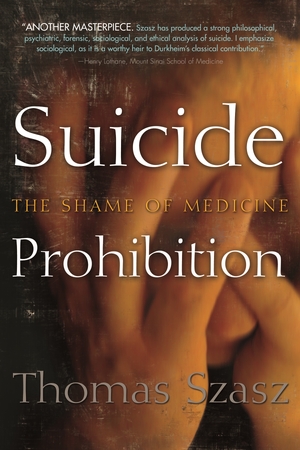"[Thomas Szasz] is the preeminent critic of psychiatry in the world."—Richard Vatz, Towson University
"Liberty and autonomy have their most able defender in Thomas Szasz."—Sheldon Richman
"It takes an iconoclast with temerity and acumen to illuminate how unexamined myths and metaphors insidiously determine prevailing norms—norms considered unassailable and sacrosanct by the established medical/legal system."—Jeffrey K. Zeig, Director, The Milton Erickson Foundation
Description
In Western thought, suicide has evolved from sin to sin-and-crime, to crime, to mental illness, and to semilegal act. A legal act is one we are free to think and speak about and plan and perform, without penalty by agents of the state.
While dying voluntarily is ostensibly legal, suicide attempts and even suicidal thoughts are routinely punished by incarceration in a psychiatric institution. Although many people believe the prevention of suicide is one of the duties the modern state owes its citizens, Szasz argues that suicide is a basic human right and that the lengths to which the medical industry goes to prevent it represent a deprivation of that right.
Drawing on his general theory of the myth of mental illness, Szasz makes a compelling case that the voluntary termination of one’s own life is the result of a decision, not a disease. He presents an in-depth examination and critique of contemporary anti suicide policies, which are based on the notion that voluntary death is a mental health problem, and systematically lays out the dehumanizing consequences of addressing suicide prevention through psychiatric treatments.
Table of Contents
Introduction
1. Suicide Prohibition
2. The Suicide Prohibition Agent
3. The Marriage of Asclepius and Atropos
4. Separation: Emigration, Secession, Suicide
5. The Shame of Medicine
6. Envoi
Appendix: “On Suicide” by David Hume
Notes
Bibliography
Index
About the Author
Thomas Szasz is professor emeritus of psychiatry at the State University of New York Upstate Medical University in Syracuse, New York. His books include Law, Liberty, and Psychiatry, The Manufacture of Madness, Ideology and Insanity, Ceremonial Chemistry, The Myth of Psychotherapy, Psychiatry, and The Medicalization of Everyday Life.
5.5 x 8.5, 148 pages
October 2011

